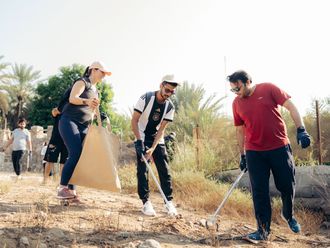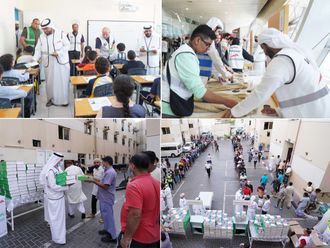Dubai: A rash of emergency admissions and deaths of pets is the worst a top veterinary surgeon has witnessed in Dubai in the last 20 years, she says.
Dr Sara Elliott, Chief of British Veterinary Hospital, said the number of pets needing emergency care from heat exhaustion has spiked from three cases last year to 14 this summer — four of those pets died despite last-minute medical intervention.
“There is a large population growth of pets within the UAE. New expatriates are moving to the region with the intention of making it their longer term family home, and families include pets. A greater awareness and availability of pet travel means that pets are travelling with their families with many of these moving from cooler climates,” Elliott told Gulf News.
“We have had four dogs die this year on the way into our practice and successfully revived ten more from heat-related issues since it started getting really hot. These are the ones where the owners have managed to get them here in time. Who knows how many poor animals are perishing out there through negligence and ignorance?”
“There are some simple rules, such as don’t let your pets walk on ground that you can’t hold the palm of your hand on for 15 seconds. Never leave pets in the car for any time in the heat, don’t leave pets at home for more than eight hours and ensure your maids are trained and briefed if looking after your animals,” Elliott said.
Elliott said pet owners need be reminded of dangers and take more care.
“It is easy to sometimes forget just how hot it still is outside in the middle of the day. It is also very easy to overdo exercise when you return from vacation after missing your pet. Whilst we may have had an energetic summer trekking around the world and be in good physical shape, our animals have generally had a quieter and mostly inactive, indoor summer escaping the heat and cannot cope with the rapid transition we ask from them,” Elliott said.
“There is also a greater trend for people to purchase dogs which are less suited for the environment. This includes short-faced breeds, for example English bulldogs and pugs, and those designed for cold conditions such as huskies and St. Bernards. It is important to discuss with your vet the suitability of your potential pet and the health issues they may be prone to before making the commitment.”
Even smaller dogs are in danger when the mercury rises, she said.
“We had three pugs arrive too late to be saved. They had been using the concrete patio outside thanks to a specially designed dog flap on the door. The flap jammed when they were outside and they were all suffering from unrecoverable states of heatstroke within 20 minutes.
“Even the animals we save are often left with long-term damage to their brains, organs, hearing and sight, with some developing seizures, heart disease, changes in personality — generally a poorer quality of life — plus requirements for complex diets, all through a moment of neglect or poor judgement from their owners. We had a golden retriever found tied up outside the house who we saved despite chronic heatstroke, but his resulting kidney disease meant he had to be put to sleep — he lost eight years of life due to mistreatment by those he relied upon.”
Dr Elliott also stressed the need to get maids and other home help, who are often tasked with looking after pets, up to speed with care requirements, particularly during the summer months.
“We have met many baffled pet owners, who can’t understand what is wrong with their animals and it transpires there may have been incidents while under the care of maids. With temporary help, there are often communication issues, cultural differences and fear of punishment, so there needs to be very clear rules and explanations when leaving your loved ones in the hands of a stranger or you may get a terrible shock when you return from work or vacation.”












